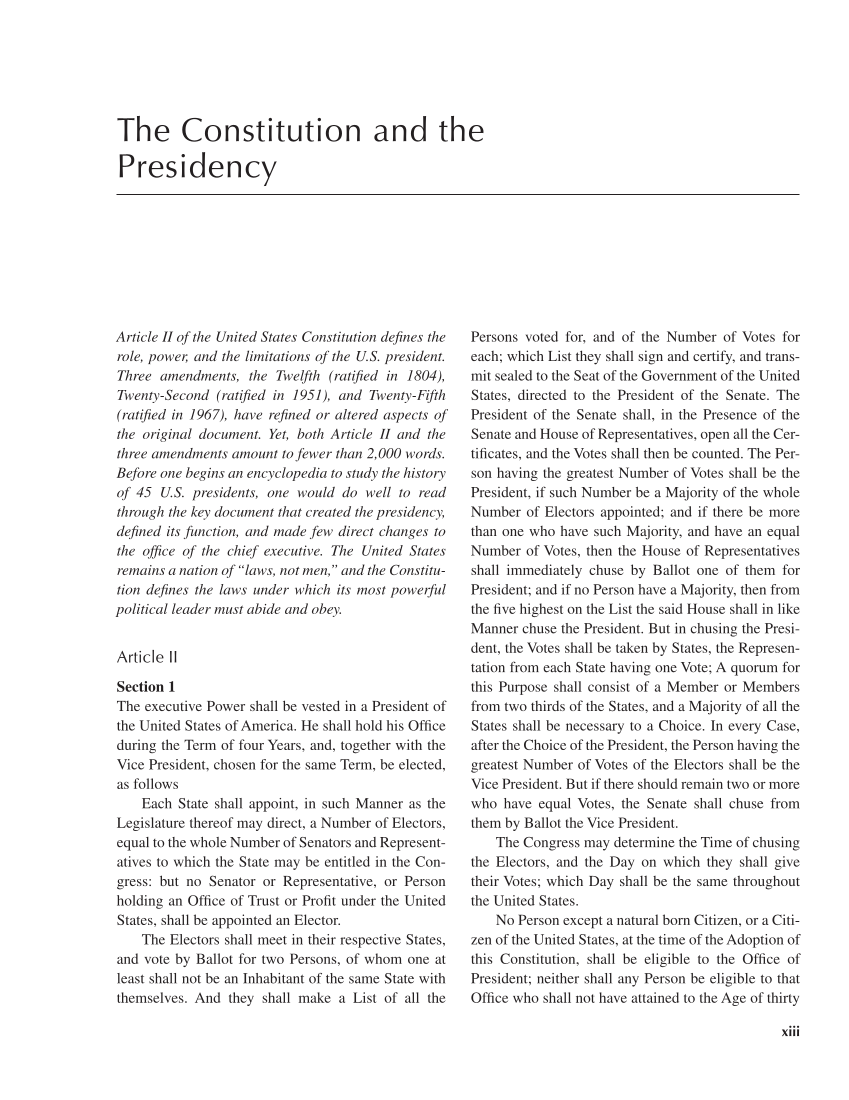xiii The Constitution and the Presidency Article II of the United States Constitution defines the role, power, and the limitations of the U.S. president. Three amendments, the Twelfth (ratified in 1804), Twenty-Second (ratified in 1951), and Twenty-Fifth (ratified in 1967), have refined or altered aspects of the original document. Yet, both Article II and the three amendments amount to fewer than 2,000 words. Before one begins an encyclopedia to study the history of 45 U.S. presidents, one would do well to read through the key document that created the presidency, defined its function, and made few direct changes to the office of the chief executive. The United States remains a nation of “laws, not men,” and the Constitu- tion defines the laws under which its most powerful political leader must abide and obey. Article II Section 1 The executive Power shall be vested in a President of the United States of America. He shall hold his Office during the Term of four Years, and, together with the Vice President, chosen for the same Term, be elected, as follows Each State shall appoint, in such Manner as the Legislature thereof may direct, a Number of Electors, equal to the whole Number of Senators and Represent- atives to which the State may be entitled in the Con- gress: but no Senator or Representative, or Person holding an Office of Trust or Profit under the United States, shall be appointed an Elector. The Electors shall meet in their respective States, and vote by Ballot for two Persons, of whom one at least shall not be an Inhabitant of the same State with themselves. And they shall make a List of all the Persons voted for, and of the Number of Votes for each which List they shall sign and certify, and trans- mit sealed to the Seat of the Government of the United States, directed to the President of the Senate. The President of the Senate shall, in the Presence of the Senate and House of Representatives, open all the Cer- tificates, and the Votes shall then be counted. The Per- son having the greatest Number of Votes shall be the President, if such Number be a Majority of the whole Number of Electors appointed and if there be more than one who have such Majority, and have an equal Number of Votes, then the House of Representatives shall immediately chuse by Ballot one of them for President and if no Person have a Majority, then from the five highest on the List the said House shall in like Manner chuse the President. But in chusing the Presi- dent, the Votes shall be taken by States, the Represen- tation from each State having one Vote A quorum for this Purpose shall consist of a Member or Members from two thirds of the States, and a Majority of all the States shall be necessary to a Choice. In every Case, after the Choice of the President, the Person having the greatest Number of Votes of the Electors shall be the Vice President. But if there should remain two or more who have equal Votes, the Senate shall chuse from them by Ballot the Vice President. The Congress may determine the Time of chusing the Electors, and the Day on which they shall give their Votes which Day shall be the same throughout the United States. No Person except a natural born Citizen, or a Citi- zen of the United States, at the time of the Adoption of this Constitution, shall be eligible to the Office of President neither shall any Person be eligible to that Office who shall not have attained to the Age of thirty
Document Details My Account Print multiple pages
Print
You have printed 0 times in the last 24 hours.
Your print count will reset on at .
You may print 0 more time(s) before then.
You may print a maximum of 0 pages at a time.























































































































































































































































































































































































































































































































































































































































































































































































































































































































































































































































































































































































































































































































































































































































































































































